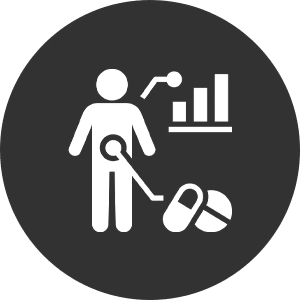PLATYPUS – the Australian extension of the OCTOPUS trial

type of intervention
Interventional, Randomised controlled trial (interventional)

recruitment status
Recruiting

region
QLD
type of ms
Primary progressive MS, Secondary progressive MS
PLATYPUS is the Australian extension of a revolutionary trial based in the United Kingdom (UK) called OCTOPUS, which aims to enroll participants in the UK and Australia over the next few years.
OCTOPUS (including PLATYPUS) is a trial which will test multiple treatments with the aim to find one that can slow down, and ultimately stop, the progression of disability in people with primary or secondary progressive MS.
The trial aims to be more efficient by using the multi-arm, multi-stage (MAMS) approach - the first time this has ever been done for an MS clinical trial. The trial will run over a number of years and has two stages.
Analysis Stage 1
In the first stage participants have magnetic resonance imaging (MRI) scans as well as other tests. At the end of this stage, researchers review the magnetic resonance imaging (MRI) data from participants’ scans.
This analysis of Analysis Stage 1 data will help researchers decide whether the treatments under investigation are likely to be helpful in slowing disease progression.
If the MRI scans show that a treatment is not making a difference, then that arm will be stopped.
Any treatments that seem to have a beneficial effect on MS at this point of analysis will continue to be tested in the second stage.
Stage 1 has completed in the OCTOPUS trial in the UK, so all Australian PLATYPUS participants will commence the study in Stage 2.
Analysis Stage 2
During the second stage more participants will be recruited to join each treatment. At this stage, researchers will be looking at clinical data to see whether the treatments can, in fact, slow down the progression of MS.
Currently, the trial compares two treatment groups, or "arms", with one control group. New arms can also be added in the future to test other new and promising drugs.
Initially at least, the treatments tested will be repurposed treatments, meaning they are already in use for other conditions. These treatments will largely be focused on promoting the repair of damaged myelin, and the protection of nerves from damage.
Recruiting soon in NSW/VIC/WA/TAS.
- Participants with a confirmed diagnosis of MS
- A diagnosis of Secondary Progressive MS (SPMS) or Primary Progressive MS (PPMS)
- Steady progression as assessed by the treating clinician, rather than relapse** must be the major cause of increasing disability in the preceding 2 years. Progression can be evident from either an increase of at least 1 point if on the Expanded Disability Status Scale (EDSS) score <5.5, or an increase of at least 0.5 point if EDSS score ≥5.5, and/or clinical documentation of increasing disability.
- EDSS 4.0 – 8.0 (inclusive) as assessed at the time of randomisation by the assessor
- Aged 25 - 70 years old inclusive on the day of randomisation
- Adequate renal function at screening, defined as eGFR ≥60ml/min/1.73m2 (as per local method)
- Normal liver function at screening consisting of all the following: a. Serum bilirubin <1.5 x ULN (except for participants with Gilbert’s disease, for whom the upper limit of serum bilirubin is 51.3 µmol/l or 3mg/dl) b. Either aspartate aminotransferase (AST) or alanine aminotransferase (ALT) <3 x ULN; (it must be stated whether one or both tests were performed. Where both results are available, both must confirm eligibility) c. Alkaline phosphatase <3 x ULN
- Must be able and willing to comply with the treatment and assessment schedule and requirements including being able to start trial treatment ≤ 2 weeks after randomisation.
- Written informed consent provided
(Criteria from Protocol Version 7.0 dated 30 Sep 2024; **relapse defined in the study Protocol)
- Relapse** ≤ 12 weeks before randomisation
- Significant comorbidity (as confirmed by treating clinician) a. Cardiac failure (clinical diagnosis) b. Significant Respiratory comorbidity c. Renal failure d. Malignancy (except if in complete remission) – e.g. solid organ or haematological or melanoma e. Uncontrolled thyroid disease
- [Please note this number is no longer core exclusion criteria: moved to Metformin exclusion criteria only - Rare hereditary problems of galactose intolerance or glucose-galactose]
- Active partial or total malabsorptive disease (e.g. coeliac disease)
- Alcohol use disorder or illicit drug use within the last 5 years (excluding cannabis for symptomatic relief)
- Female participants that are pregnant or breast-feeding.
- Women of child-bearing potential who are unwilling or unable to use an acceptable method of contraception*** whilst on trial treatment and up to 12 weeks after the last dose of study drug.
- Use of an investigational medicinal product or investigational medical device ≤ 26 weeks before randomisation.
- Men with a partner of child-bearing potential unwilling to use an acceptable method of contraception during the trial and for 12 weeks after the last dose of trial treatment.
- Male participants unwilling to desist from sperm donation during the trial and for 12 weeks after the last dose of trial treatment.
- Been treated with steroids (intravenous and/or oral) for MS relapse or progression ≤ 12 weeks before randomisation*
Note: Participants on steroids for another medical condition may be included in the trial provided the steroid prescription is not for any aspects of their MS.
- Current or previous treatment with OCTOPUS trial treatments ≤ 26 weeks before randomisation. With the exception of participants taking health supplements, including multi-vitamins, that contain a dose of ≤100mg of Alpha Lipoic Acid. These participants can be randomised but must wait 7 days from the last dose before randomisation.
- Commencement of DMT and/or fampridine ≤ 26 weeks before randomisation*
- Contraindicated medications*** that are not permitted with trial treatments.
- Participants who are not eligible for any of the trial treatments according to the eligibility criteria listed for each individual trial treatment in the drug appendices of the study Protocol. Please note that participants can enter the trial if they are eligible for at least one of the trial treatment arms, but do not need to be eligible for all.
*These participants may undergo a further screening visit once the specified window has expired and may be included if no further treatment has been administered in the intervening period.
In addition to the core inclusion and exclusion criteria above, there are arm-specific eligibility criteria to apply for to arm.
(Criteria from Protocol Version 7.0 dated 30 Sep 2024; ***acceptable method of contraception and contraindicated medications; and arm-specific eligibility are defined in the study Protocol.)
To determine whether you may be eligible to participate in PLATYPUS, you are invited to use the online screening portal, MS Trial Screen.
Recruiting
PLATYPUS Clinical Trial Manager: platypus@griffith.edu.au
Further information can be found on the MSA PLATYPUS webpage or the OCTOPUS Trial website, which includes global trial updates and news.
Full details on the trial can be found on the UK Clinical Study Registry (Trial number: ISRCTN14048364).
NSW/VIC/QLD/WA/TAS
Yes
14/10/2025
Subscribe to our newsletter
"*" indicates required fields

